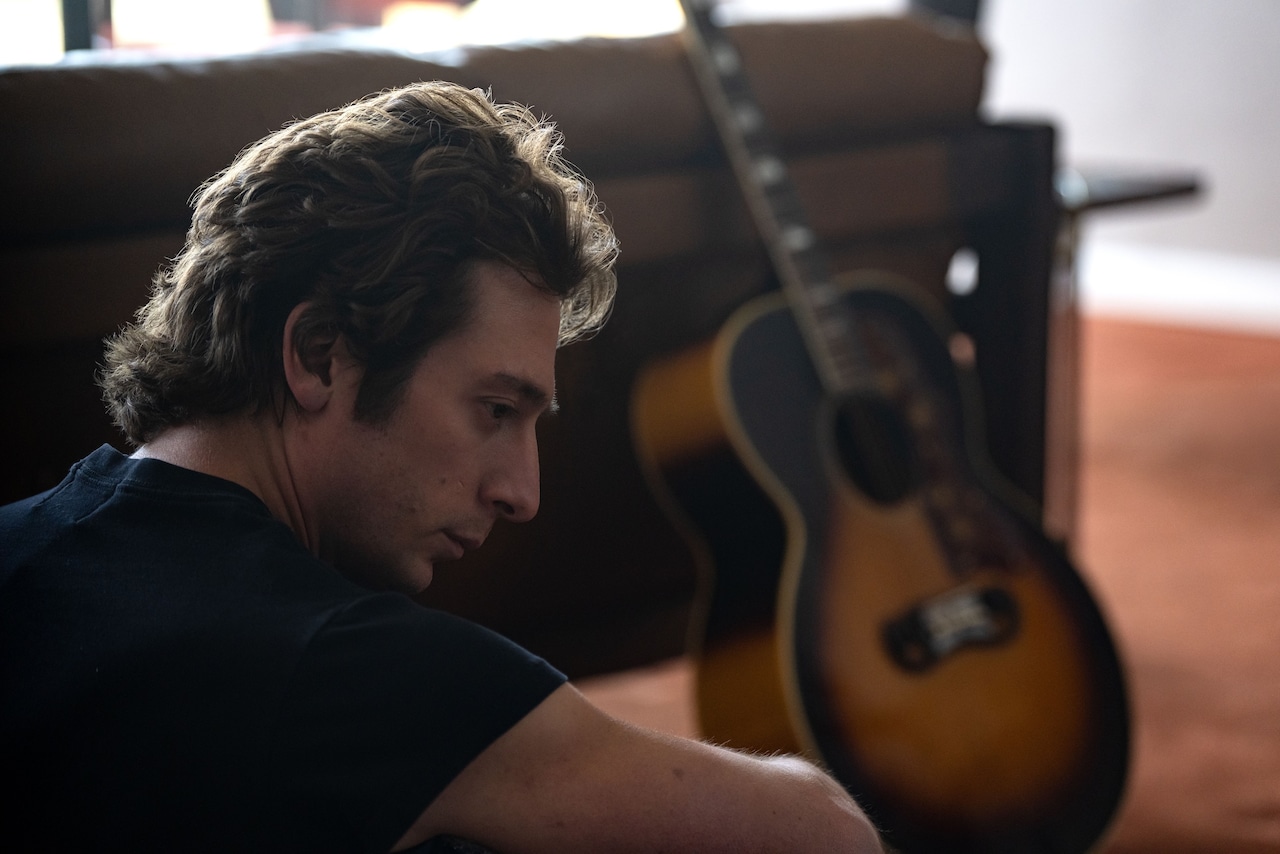
‘Springsteen: Deliver Me from Nowhere’ review: Jeremy Allen White captures Bruce’s haunted genius
Bruce Springsteen was on the climb to mega-stardom.
After playing for nearly a year straight with the E Street Band on The River Tour, with the hit song “Hungry Heart” pumping out of speakers everywhere, he was ready to come home.
But once he got there, thoughts of his past wouldn’t quit.
Away from the crowds, visions of his childhood took over.
In the fall of 1981, as record executives waited on his next hit, Bruce’s memories quaked with fear and pain.
It’s here that “Springsteen: Deliver Me from Nowhere” finds The Boss.
A commanding rock star, the same one who opened the Brendan Byrne Arena (now the Meadowlands Arena) with six concerts that summer, left exposed to deep wounds.
As the noise of the arena subsided, scenes of Bruce’s father in the throes of alcoholism filled his mind.
The weight that two-time Emmy winner Jeremy Allen White can bring to a role, like he does as Carmy “The Bear” Berzatto in the acclaimed FX/Hulu series “The Bear,” is in full effect here.
His performance as Bruce is suffused with that heaviness, a haze of ever-present trauma and depression — the kind that remains when the bright lights of the stage leave the picture.
READ MORE: A deeper look inside the film, as told by Jeremy Allen White, director Scott Cooper and more
So while White does sing and speak as Springsteen, fully embracing his sweaty, leave-it-all-on-the-stage commitment as a performer, it’s the troubled, pensive mood behind the spotlight that makes the actor a kindred spirit of Bruce.
It’s a relief to know that White’s first demonstration of “Bruce voice” isn’t the sum total of where this film goes.
Based on the 2023 book “Deliver Me from Nowhere: The Making of Bruce Springsteen’s Nebraska” from Montclair’s Warren Zanes, the film, written and directed by Scott Cooper (“Crazy Heart,” “The Pale Blue Eye,” “Black Mass”), zooms in on a specific period in Bruce’s life and discography.
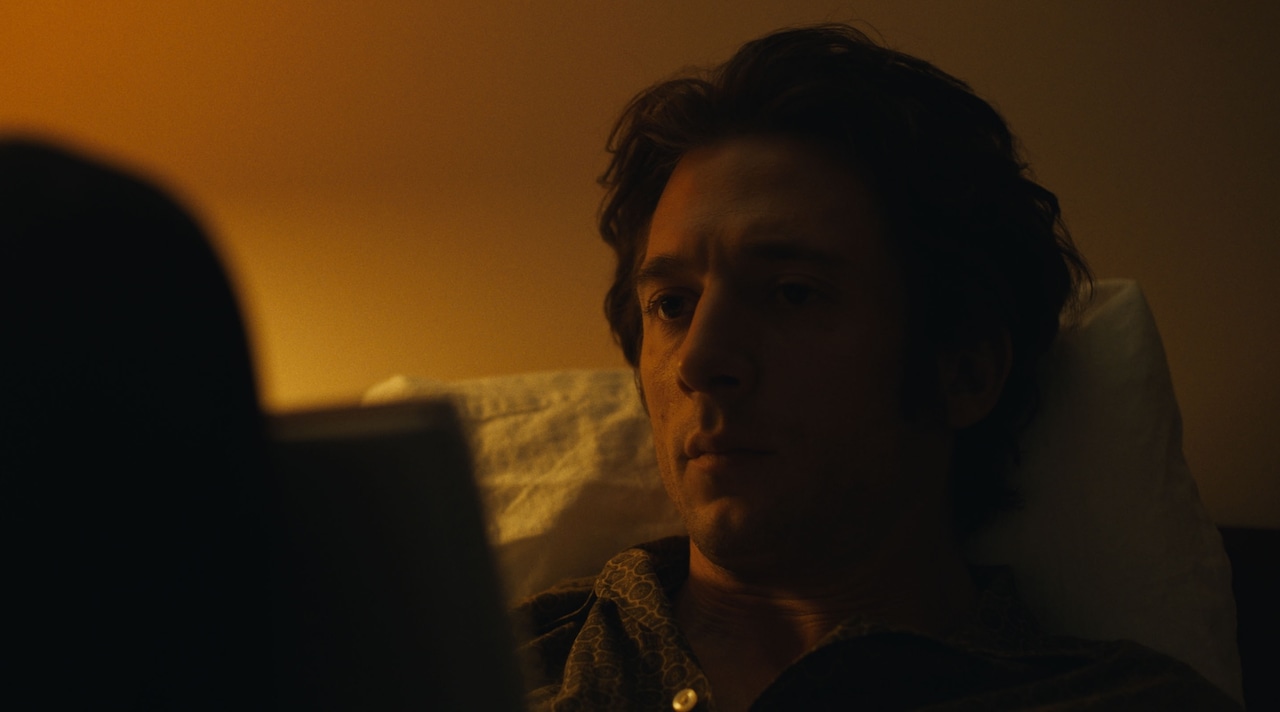
The movie shows how Springsteen’s post-tour mood and influences in film, literature and music fed his creativity and his decision to release his treasured “Nebraska” album in quiet, solo demo form, without the fullness of the E Street Band.
“Nebraska” also marked a turning point for how Bruce would start to address his depression, for the first time acknowledging that he needed help.
“Hey, somebody out there, listen to my last prayer,” Springsteen sings in the song “State Trooper.”
“Hi-ho, Silver-O, deliver me from nowhere.”
Finding the real
Looking for a space to work on new music, Bruce rents a cozy home on a reservoir in Colts Neck.
It’s there that the magic happens as he writes the songs that would become the 1982 album, committing “Nebraska” to tape on a four-track recorder in the bedroom — from the title track to “Atlantic City,” “My Father’s House,” “State Trooper” and more, each as haunting as Bruce is haunted.
Because Springsteen is so consumed by the past, the film also flashes back to Freehold in 1957.
Matthew Pellicano Jr., a child actor from Fair Lawn who bears a remarkable resemblance to Springsteen, plays young Bruce in scenes that effectively illustrate the pain bearing down on the then-31-year-old pride of New Jersey.
The abject fear in Pellicano’s eyes drives the point home: as a kid, Bruce was terrified, and that terror seared into his being.
Emmy winner Stephen Graham (“Adolescence”) is intimidating as the source of Bruce’s fear — his father, Douglas “Dutch” Springsteen.
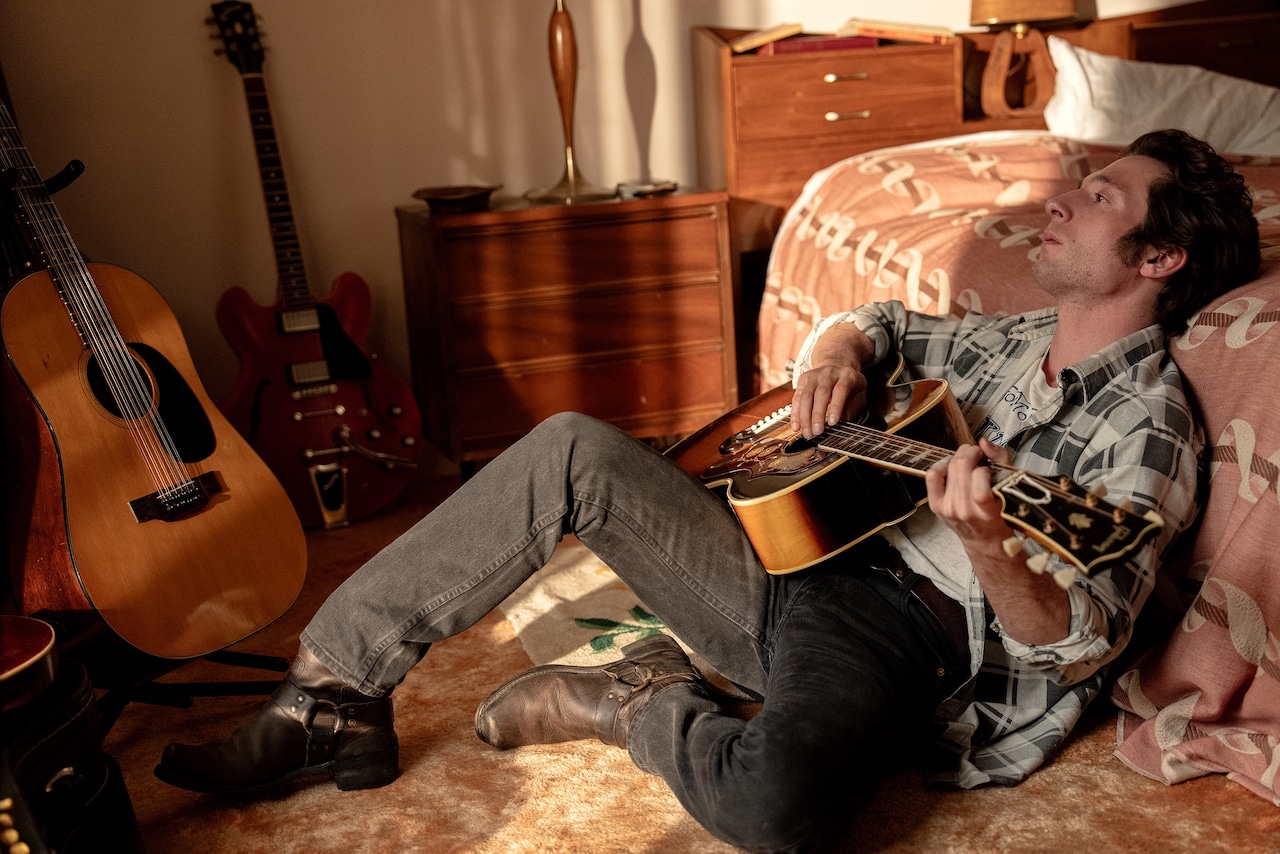
Bruce’s mother, Adele Springsteen, played by Gaby Hoffmann, sends her son to retrieve his father from the local bar. Picking his dad out from among the turned backs of local men — then informing him that Mom says it’s time to come home — is a singularly harrowing affair. Hearing his parents arguing at night is its own violence.
As the adult Springsteen channels his childhood trauma and pain into an album with dark, revealing themes, his manager, Jon Landau, serves as a tether to the business side of music.
Landau is played by Oscar nominee and Emmy winner Jeremy Strong (“Succession,” “The Apprentice”), who is solidifying his status as the go-to guy for serious, committed performances as advisers and consiglieres.
All the chatter about expectations and career trajectory from people like Columbia Records boss Al Teller — played by Wyckoff’s David Krumholtz — whizzes around outside Bruce’s Colts Neck bubble. Diner meetings between artist and manager are more like meetings of brothers checking in with each other. The trust is understood and doesn’t have to be overplayed.
Springsteen tells Landau he’s “trying to find the real in all the noise.”
“You find something real, I’ll deal with the noise,” Landau says.

‘A f—ing folk album’
The “real” that Bruce finds is helped along by key inspirations.
They come from the 1973 Terrence Malick movie “Badlands” and the true story of the 1950s Nebraska killer Charles Starkweather and Caril Ann Fugate, along with the 1955 Charles Laughton film “The Night of the Hunter,” which a young Springsteen sees in a theater with his father. He was also moved by the writing of Flannery O’Connor and the proto-punk band Suicide‘s 1977 debut album (compare “State Trooper” with the Suicide song “Frankie Teardrop”).
Cooper shows Bruce discovering some of these influences by TV, record and microfiche.
“Nebraska”-era Bruce seems just as moved by the sight of his old childhood home, decaying in front of his eyes but frightfully alive in his mind, just like in the song “My Father’s House.” He drives by and lingers on the periphery, the dilapidated house’s silence belying its loud, outsize presence in his memory.
The only other person in the Colts Neck house with Bruce is guitar tech Mike Batlan, played by Emmy winner Paul Walter Hauser (“Black Bird”). Batlan helps him get the “Nebraska” demo on tape. Landau receives the nondescript cassette like a holy object.

Springsteen tries recording the new material with the E Street Band, as he normally would, but the larger sound obscures the spare, piercing nature of his original creative intent. He’s adamant about releasing the music as is, from the acoustic bedroom demo tape — with the addition of some echo reminiscent of Elvis’ early Sun records.
“I want it to feel like I’m in the room by myself‚“ White’s Springsteen says in the film.
One exception is the song “Born in the U.S.A.,” which goes from soulful, downbeat Colts Neck demo to soaring E Street Band arena anthem. The movie shows this moment of discovery at the Power Station recording studio in New York.
Record executives salivate over the potential for an entire album built around the song. But they have to wait for the next release to propel Bruce into superstardom with the “Born in the U.S.A.” album.
Springsteen has an immovable plan to release “Nebraska” without the E Street Band, without him being on the cover and without interviews, singles and touring.
A music executive’s dream.
“A f—ing folk album?!” says producer extraordinaire Jimmy Iovine, voiced by the real Iovine in the film.
Yes, a f—ing folk album.
Actor-comedian and podcast star Marc Maron, a Jersey City native who spent part of his childhood in Wayne, plays Chuck Plotkin, the producer who mastered “Nebraska.”
He takes the music from cassette recording to the classic that just turned 43 years old.
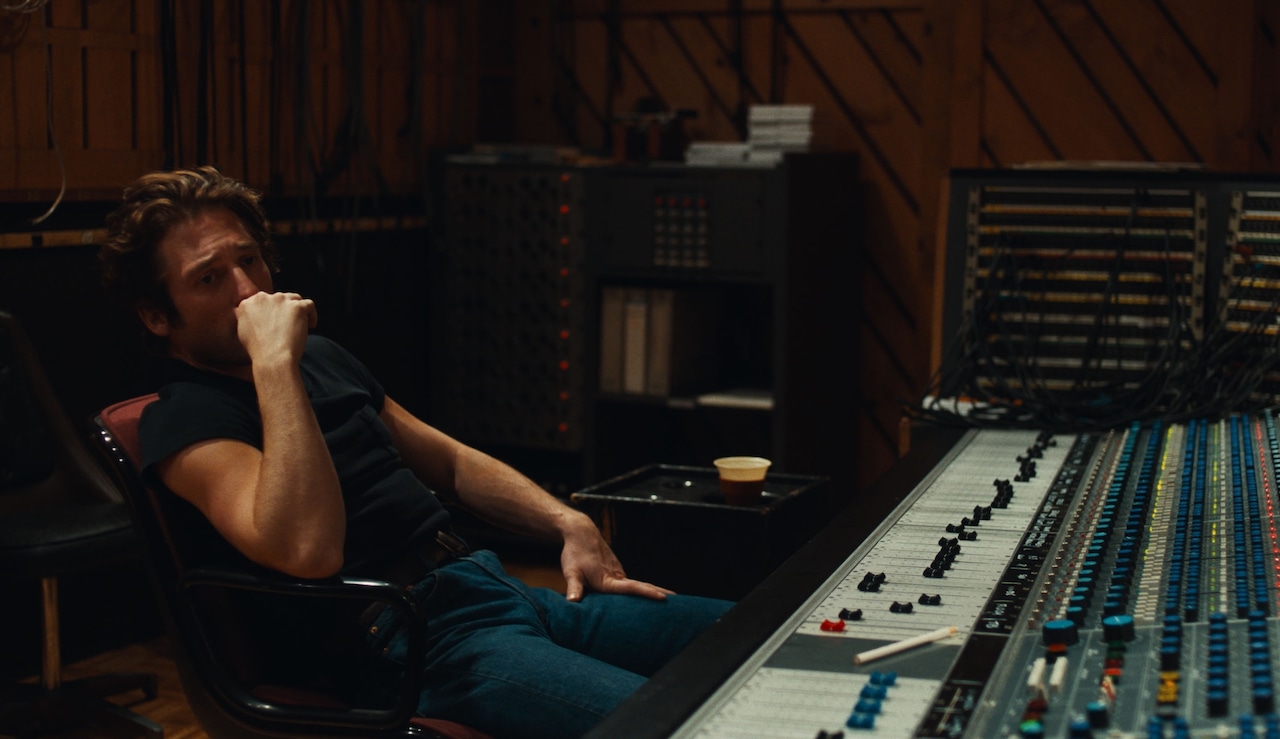
Under the watchful eye of Bruce
Springsteen’s vision arrived in the hands of fans exactly as intended.
He wouldn’t perform the “Nebraska” songs in front of huge crowds until the Born in the U.S.A. Tour in 1984, when he spent 10 nights lighting up the Meadowlands.
During the filming of “Deliver Me from Nowhere,” White performed “Born to Run” on the same stage — the current Meadowlands Arena and former Brendan Byrne Arena, long shuttered as a concert venue and now home to TV and film production.
The movie shows off its obvious dedication to filming at Springsteen’s famous New Jersey haunts, from his home stage at The Stone Pony to the streets of his hometown Freehold and the Asbury Park surf. Other scenes were filmed in Bayonne, Rahway, Newark, Mountain Lakes — subbing in for Colts Neck — Rockaway, Montclair and more.
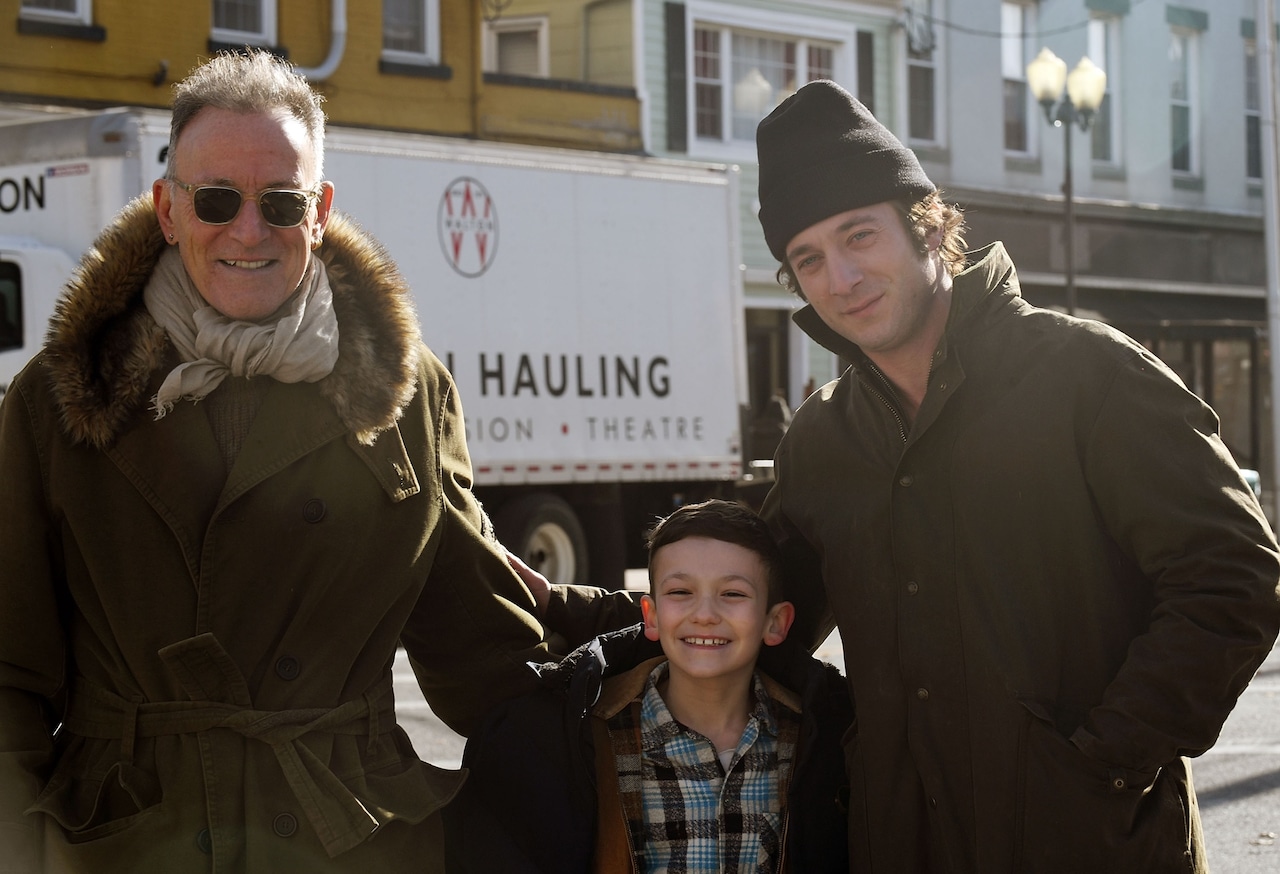
Not shown: Springsteen himself, watching a chapter of his life unfold on set.
Bruce gave his blessing for Cooper to make this film, but he also gave his time and presence.
If White was there, there was always a good chance The Boss was, too.
READ MORE: See N.J. film locations for ‘Springsteen: Deliver Me from Nowhere’
The actor pulls off quite the feat for someone who had to be Springsteen while the man was standing right there.
Particularly in the quiet scenes, including those where Springsteen is writing songs, White manages shades of the intimacy seen in “Crazy Heart.”
The 2009 film, Cooper’s feature directorial debut, stars Jeff Bridges in an Oscar-winning performance as faded country music star Otis “Bad” Blake, who tries to keep his music alive as he succumbs to the destructive force of alcoholism.
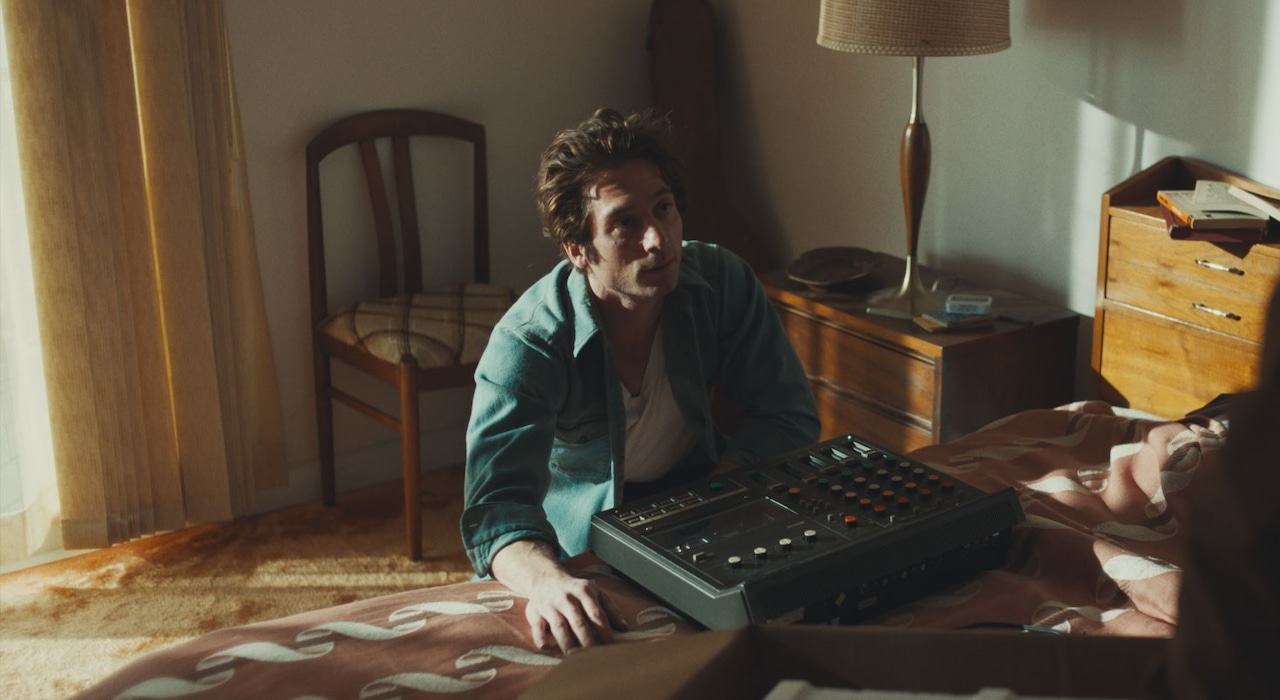
Born to run
“Deliver Me from Nowhere,” like “Crazy Heart,” also deploys a romance.
In both films, this development highlights the possibilities of connection and change, along with the flaws of its musical hero.
Springsteen purists will not recognize the name Faye Romano, a character played by Odessa Young (“Black Rabbit”).
The single mother, who sports a curtain of blond hair styled after the Jersey-raised Debbie Harry of Blondie, is a composite character based on women Bruce dated. The spark between Bruce and Faye gives the movie a fictional romance that plays out in Asbury Park (though her home scenes are very visibly of Bayonne).
Faye, a dedicated Bruce fan, goes to the The Stone Pony just to see him play — and of course, he’s quite the regular. When they start dating, he takes her to the Carousel House — outfitted with an actual lit carousel — when it’s closed.
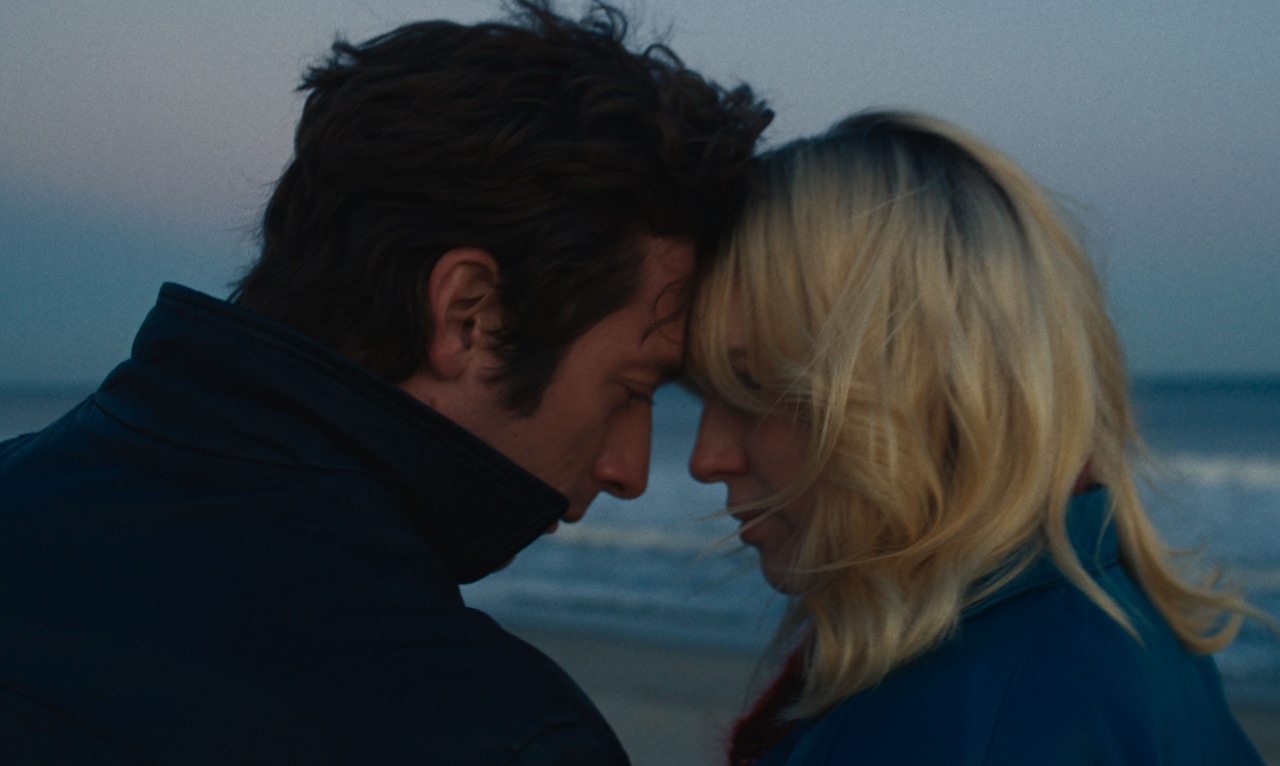
Though this presents a prime opportunity for romance-by-carousel, she worries that they’re not supposed to be there. He reminds her that such a transgression is not a problem when you’re Bruce Springsteen in Asbury Park.
Their relationship allows the movie to show Springsteen’s shortcomings.
He lets himself be known and be vulnerable, but only for so long. He knows his father lives inside of him, and the hurt he’s felt his whole life keeps him from making lasting connections.
That’s why it’s so poignant when White and Graham depict the same father-son relationship, decades past the trauma that would define Bruce’s album.
A man, once feared, now diminished by age but proud of his son.
And the son, a big rock star, sitting in his father’s lap for the first time.
“Springsteen: Deliver Me from Nowhere,” rated PG-13, runs 1 hour and 54 minutes and is in some theaters Thursday, Oct. 23. The movie opens wide Friday, Oct. 24.
If you purchase a product or register for an account through a link on our site, we may receive compensation. By using this site, you consent to our User Agreement and agree that your clicks, interactions, and personal information may be collected, recorded, and/or stored by us and social media and other third-party partners in accordance with our Privacy Policy.
First Appeared on
Source link






